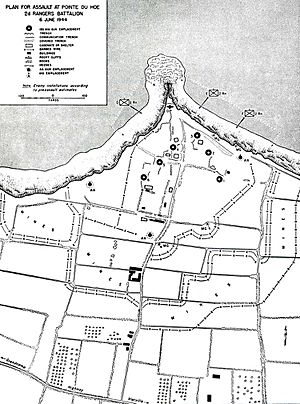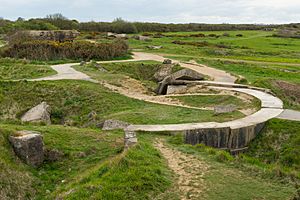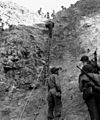Pointe du Hoc facts for kids
Quick facts for kids Battle of Pointe du Hoc |
|||||||
|---|---|---|---|---|---|---|---|
| Part of Normandy Landings | |||||||
|
Map of Pointe du Hoc, showing German installations and what was believed to be the locations of the 155mm guns. |
|||||||
|
|||||||
| Belligerents | |||||||
| Commanders and leaders | |||||||
| Units involved | |||||||
|
|
||||||
| Strength | |||||||
| 225 infantry 2 battleships |
200 infantry 4 machine gun emplacements 6 empty casemates 1 observation bunker |
||||||
| Casualties and losses | |||||||
| 135 killed/wounded | Landing: unknown Counter-attacks: 50 Germans killed and 40 captured. Unknown number of alleged French collaborators executed. |
||||||
Pointe du Hoc is a place on the coast of Normandy in northern France. In 1944, it was part of the biggest sea invasion in history. During World War II, the Allied forces planned to attack France, which was controlled by Nazi Germany.
Allied commanders saw that Pointe du Hoc had six very large 155mm cannons. These powerful guns were hidden in strong concrete bunkers. They could easily sink Allied ships trying to land on the beaches.
Allied planes from England bombed Pointe du Hoc. However, the heavy artillery guns had been moved before the bombing. This meant the bombs did not damage them.
Pointe du Hoc was surrounded by very steep cliffs that dropped straight into the sea. A very narrow beach appeared at the bottom of the cliffs only at certain times of the day.
For about five months, U.S. Rangers trained with British commandos. They practiced climbing British coastal cliffs to prepare for the attack.
The Allies used special flat-bottomed landing boats to carry troops onto the beaches. These boats were called LCAs and LCVPs, or Higgins boats. British navy sailors drove them.
The boats were lowered into the sea a few kilometers away from the cliffs. The British had added extra armour to the sides of the boats. This made them safer but also slower and harder to steer.
Contents
The Attack on Pointe du Hoc
Climbing the Cliffs
The American 2nd and 5th Army Ranger Divisions attacked the nearly 100-meter-high cliffs at Pointe du Hoc. Colonel James Earl Rudder led this brave attack.
The attack began at 6:30 AM. At this time, the battleship USS Texas stopped firing its guns at Pointe du Hoc. Due to bad weather, the Rangers' boats went off course. This made them take an extra half hour to reach the beach.
By the time the Rangers arrived, the German soldiers had come out of their bunkers. They had set up defensive positions along the top edge of the cliff.
When the landing boats reached the beach, their doors opened. The Army Rangers quickly ran up the beach towards the cliffs. The soldiers used ropes attached to rocket-propelled grappling hooks to climb the steep cliffs.
Two soldiers carried the ropes and grappling hooks in a wooden box. The Rangers also used ladders that were attached to the landing boats. More grappling hooks were shot up from the boats to help them climb.
Finding the German Guns
When the Rangers reached the top of the cliffs, small groups of soldiers attacked the German positions. After reaching the German bunkers, where the big guns were supposed to be, the Rangers found them empty. The guns were no longer there.
The Rangers then moved inland to search for the missing guns. Once they found the guns, they used thermite fire grenades. These grenades melted important parts of the guns, making them useless.
Out of 225 soldiers who started the attack, only 90 were still able to fight when help arrived.
Images for kids
-
A 15.5 cm K 418(f) gun, of the type used in the Pointe du Hoc battery, is preserved at the Atlantic Wall on Jersey.
-
Pre-invasion bombing of Pointe du Hoc by 9th Air Force A-20 Havoc bombers
-
US President Ronald Reagan giving a speech commemorating the 40th anniversary of the event.
See also
 In Spanish: Pointe du Hoc para niños
In Spanish: Pointe du Hoc para niños
 | Chris Smalls |
 | Fred Hampton |
 | Ralph Abernathy |










